About The JN Reddy Medal
The JN Reddy Medal was established in 2018 and is conferred in recognition of distinguished contributions to the field of mechanics of advanced materials and structures. Instituted by the Mechanics of Advanced Materials and Structures journal, it honors J.N. Reddy, well-known authority in applied and computational mechanics and founding Editor-in-Chief of MAMS Journal, and it commemorates his contributions as a researcher, teacher, and author of textbooks. The JN Reddy Medal is conferred in person at the annual MAMS Conferences.
Dr. Arif Masud is the winner of the 2023 JN Reddy Medal.
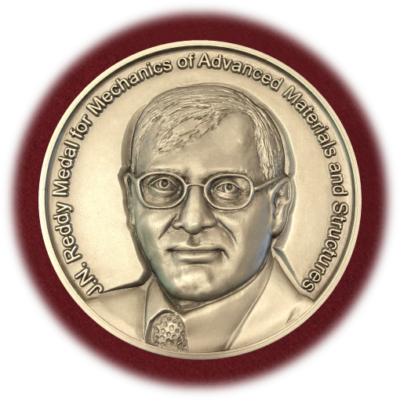
The Inaugural JN Reddy Medal
The inaugural medal was presented to Professor J.N. Reddy at the First International Conference on Mechanics of Advanced Materials and Structures held at Politecnico di Turin, Torino, Italy, 2018.
J. N. Reddy
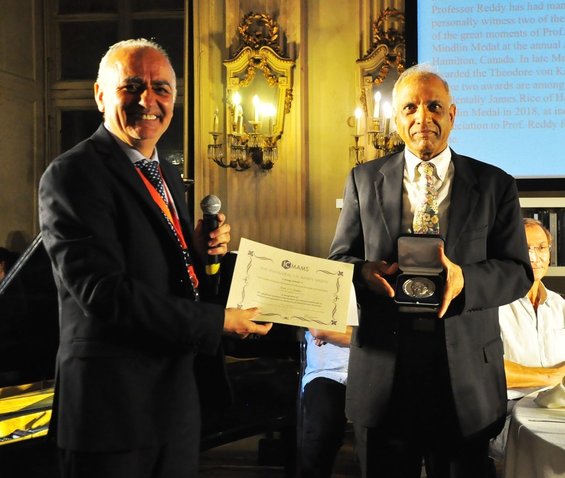
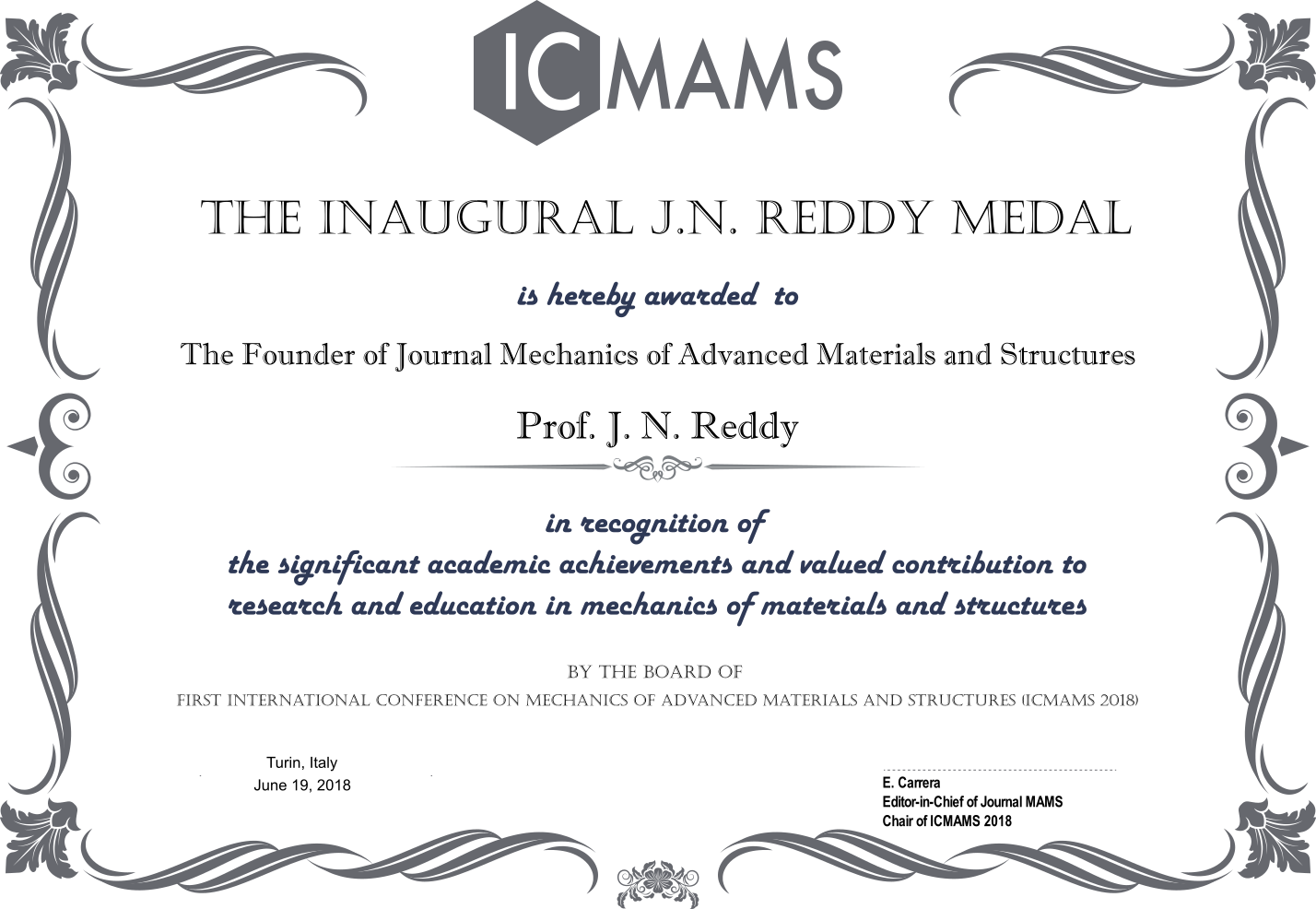
J. N. Reddy (born 12 August 1945) is a Distinguished Professor, Regents’ Professor and inaugural holder of the Oscar S. Wyatt Endowed Chair in Mechanical Engineering at Texas A&M University, College Station, Texas, USA. He is one of the researchers responsible for the development of the Finite Element Method (FEM). He is an authoritative figure in the broad area of mechanics. He has made significant seminal contributions in the specific areas of finite element method, plate theory, solid mechanics, variational methods, mechanics of composites, functionally graded materials, fracture mechanics, plasticity, biomechanics, classical and non-Newtonian fluid mechanics, and applied functional analysis. Reddy has over 620 journal papers, 20 books (with several second and third editions), and has given numerous (over 150) national and international talks. He has served as a member of International Advisory Committee at ICTACEM, 2001 and keynote addressing in 2014.
He has advised around 36 postdoctoral fellows, 65 Ph.D. students, and 46 M.S students over 40 years. Many of his (former) Ph.D. and postdoctoral students are currently faculty members in reputed universities throughout the world. He has been listed as an ISI Highly Cited Author in Engineering by the ISI Web of Knowledge, Thomson Scientific Company. Reddy is one of the original top 100 ISI Highly Cited Researchers in Engineering around the world, with h-index of over 66 as per Web of Science; the number of citations is over 54,000 with h-index of 94 and i10-index of 438 (i.e., 438 papers are cited at least 10 times) as per Google Scholar.
In addition to being a world-class researcher, he is also renowned as an educator. He has won many teaching awards, and his books are widely used as textbooks in many courses at various universities across the world. His books are known for explaining very difficult theories in a lucid manner.
THE 2024 JN REDDY MEDAL RECIPIENT
Prof. Somnath Ghosh was recognized as The 2024 JN Reddy Medalist. He will be awarded the medal and a certificate during the Fourth International Conference on Mechanics of Advanced Materials and Structures hosted by the Ramaiah Institute of Technology, Bangalore, India during 11-13 December 2024. A brief professional background and contributions of Prof. Ghosh are included here.
Somnath Ghosh
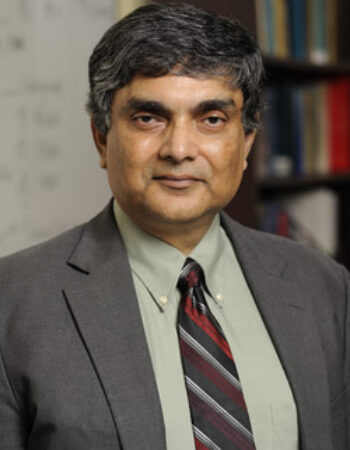
Professor Somnath Ghosh is the Michael G. Callas Professor in the Department of Civil & Systems Engineering, and a Professor of Mechanical Engineering, and Materials Science & Engineering at Johns Hopkins University. He is the founding director of the JHU Center for Integrated Structure-Materials Modeling and Simulations (CISMMS) (2013-). He is the co-Director of the NASA Space Technology Research Institute for Model-based Qualification and Certification of Additive Manufacturing IMQCAM (2023-2028). He was the Director of the multi-institutional Air Force Center of Excellence (CoE) in Integrated Materials Modeling (2012-2018). He is an internationally recognized leader in Computational Mechanics of Materials, whose pioneering multidisciplinary research, integrating multiscale-multiphysics Computational Mechanics, Computational Materials Science, ICME, and Machine Learning has made game-changing advances toward prognosis, life prediction and damage sensing of a range of structural materials including metals, composites and multifunctional materials. His group has developed powerful methods of 3D statistically equivalent representative volume elements (SERVEs), including the widely acclaimed synthetic microstructure building software DREAM.3D. His recent innovation, the Parametrically Upscaled Constitutive models (PUCMs), are considered to be a game-changer in multiscale modeling, explicitly linking material microstructure with upscaled response for predicting deformation and failure. For accelerated fatigue and multi-physics simulations, he has developed the Wavelet Transformation Induced Mult-time Scaling (WATMUS) method. His pioneering research has been integrated with material design platforms in the aerospace, propulsion and materials industries like Pratt & Whitney, GE, Rolls Royce, Lockheed Martin, as well as DoD laboratories. His innovation of the Voronoi Cell FEM (VCFEM) represented a major step in micromechanical and multiscale modeling of heterogeneous materials. Professor Ghosh has published a large number of papers in top journals with high impact factor and three books.
Professor Somnath Ghosh is a fellow of 9 professional societies including TMS, SES, EMI/ASCE, IACM, AAM, AAAS, USACM., ASM Int., and ASME. His professional awards include TMS-MPMD Distinguished Scientist/Engineer Award, EMI-ASCE Raymond Mindlin Medal, USACM J. T. Oden Medal, IACM Computational Mechanics Award, ASME-AMD Ted Belytschko Applied Mechanics Medal, ICCM Investigator Medal, TMS-SMD Distinguished Scientist/Engineer Award, and the ASCE Nathan M. Newmark Medal. Professor Somnath Ghosh has assumed leadership roles in professional societies across disciplines. He was the President of US Association for Computational Mechanics USACM (2014-2016), and was the Vice-President (2018-2020) of ASCE-Engineering Mechanics Institute Board of Governors (EMI-BoG), and the TMS/ICME Publications Chair. He was an Associate Editor of the ASME Journal of Engineering Materials and Technology, and is currently the AE of Journal of Materials Informatics and International Journal for Multi-scale Computational Engineering. He serves on the editorial boards of twelve international journals in mechanics and materials.
In conferring the 2024 JN Reddy Medal, Prof. Ghosh is cited for outstanding contributions to the field of Multiscale-Multiphysics Computational Mechanics and Materials with significant industrial impact and multidisciplinary professional leadership.
THE 2023 JN REDDY MEDAL RECIPIENT
Prof. Arif Masud was recognized as The 2023 JN Reddy Medalist. He was awarded the medal and a certificate during the Third International Conference on Mechanics of Advanced Materials and Structures hosted by the TEES Center of Innovation in Mechanics for Design and Manufacturing, College Station, TX during 9-10 August 2023. A brief professional background and contributions of Prof. Masud are included here.
Arif Masud
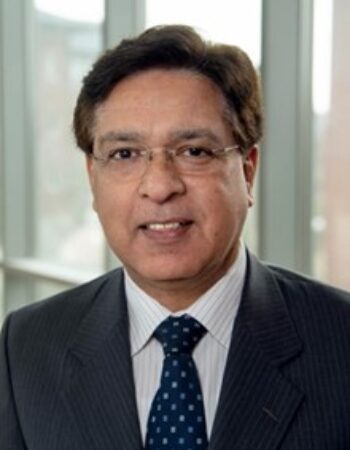
Professor Arif Masud is John and Eileen Blumenschein Professor of Mechanics and Computations in the Department of Civil and Environmental Engineering, and the Department of Aerospace Engineering at the University of Illinois Urbana-Champaign (UIUC). He also holds a joint appointment in the Department of Biomedical and Translational Sciences at the Carle-Illinois College of Medicine, UIUC. His research interests lie in the broad field of computational science and engineering, and he is well-known for his seminal work on Stabilized and Variational Multiscale Methods for complex multiphysics problems in engineering science. He has pioneered the Variational Multiscale Discontinuous Galerkin (VMDG) class of coupling methods for discrete interfacial mechanics in fluids and solids. These methods facilitate the embedding of Data-Driven techniques while preserving the consistency of the underlying physics-based models. His work on mixture theory-based computational material models for coupled thermo-chemo-mechanical processes in the curing of materials has led to novel applications in additive manufacturing. Dr. Masud has also made fundamental and pioneering contributions to the development of variationally derived closure models for turbulence, mixed methods for thermally driven nanofluids, and stabilized methods for non-Newtonian fluids for application in biofluid dynamics.
Arif Masud is President of the Society of Engineering Science (SES) 2023, and President-Elect of the Engineering Mechanics Institute (EMI) of the American Society of Civil Engineers (ASCE) 2024. He has served as an Associate Editor (AE) of the ASCE Journal of Engineering Mechanics (2004-2018), AE of the ASME Journal of Applied Mechanics (2006-2012), and currently serves on the editorial boards of twelve international journals in engineering and applied mechanics. He is the former Chair of the Computational Mechanics Committee of ASCE and former Chair of the Fluid Mechanics Committee of ASME. Arif was the General Conference Chair for the Applied Mechanics and Materials Conference of ASME (McMAT- 2011), Co-Chair for the Finite Elements in Flow Problems Conference (FEF-2019), and the General Conference Chair for the US National Congress on Computational Mechanics (USNCCM-2021). Dr. Masud has received several honors and awards for research accomplishments from various prestigious organizations. He is a Fellow of USACM, IACM, AAM, ASME, EMI, and SES. He was awarded the 2019 G.I. Taylor Medal by the Society of Engineering Science, and the 2022 Ted Belytschko Applied Mechanics Award and Medal by AMD-ASME.
In conferring the 2023 JN Reddy Medal, Prof. Masud is cited for contributions to the mechanics of coupled field problems, stabilized and variational multiscale methods, and discontinuous Galerkin methods.
THE 2022 JN REDDY MEDAL RECIPIENT
Prof. Yonggang Huang was recognized as The 2022 JN Reddy Medalist. He was awarded the medal and a certificate during a virtual award ceremony hosted by the TEES Center of Innovation in Mechanics for Design and Manufacturing and the International Conference on Mechanics of Advanced Materials and Structures, College Station, TX during 9-10 August 2023. A brief professional background and contributions of Prof. Huang are included here.
Yonggang Huang
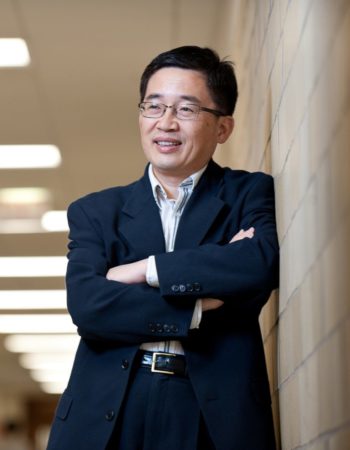
Professor Yonggang Huang is the Jan and Marcia Achenbach Professor of Mechanical Engineering (50%), Civil and Environmental Engineering (50%), and Materials Science and Engineering (0%) at Northwestern University. He is interested in mechanics of stretchable and flexible electronics, and mechanically guided deterministic 3D assembly. He has published 2 books, 30 book chapters and more than 670 journal papers, including 12 in Science and 7 in Nature. He is a member of the US National Academy of Engineering, US National Academy of Sciences, a fellow of American Academy of Arts and Sciences, and a foreign member of Chinese Academy of Sciences. His research awards in the last decade include the Drucker Medal in 2013, Nadai Medal in 2016, Thurston Lecture Award in 2019, and Honorary Membership in 2021, all from American Society of Mechanical Engineers (ASME); Prager Medal in 2017 from the Society of Engineering Sciences; Bazant Medal in 2018 and von Karman Medal in 2019 from the American Society of Civil Engineers. He also received the Guggenheim Fellowship from the John Simon Guggenheim Foundation in 2008. He is a Highly Cited Researcher in Engineering (2009), in Materials Science (since 2014), and in Physics (in 2018). He also received awards for teaching and undergraduate advising from University of Arizona (1993), University of Illinois at Urbana-Champaign (2003, 2004, 2005, 2006, 2007), and Northwestern University (2016;, 2018, 2020).
In conferring the 2022 JN Reddy Medal, Prof. Huang is cited for pioneering research on microscale plasticity and mechanics of stretchable electronics.
THE 2020 JN REDDY MEDAL RECIPIENTS
Prof. C.W. Lim and Prof. Glaucio Paulino were recognized as The 2020 JN Reddy Medalists. They were awarded with the medal and a certificate during a virtual award ceremony hosted by the TEES Center of Innovation in Mechanics for Design and Manufacturing and the International Conference on Mechanics of Advanced Materials and Structures. Brief professional backgrounds and contributions of the two recipients are included here.
C. W. Lim
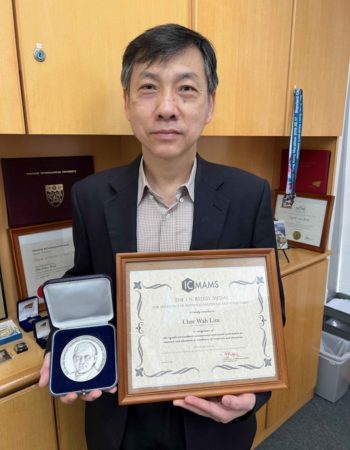
Professor Lim received a BEng from University of Technology of Malaysia, MEng and PhD from National University of Singapore and Nanyang Technological University, respectively. Prior to joining City University of Hong Kong (CityU), he was a post-doctoral research fellow at The University of Queensland and The University of Hong Kong. He has expertise in theory of plates and shells, dynamics of smart piezoelectric structures, nanomechanics, metamaterials and symplectic elasticity.
Two highlights of Professor Lim’s research impact are:
- One of Professor Lim’s first-authored papers, published in JMPS jointly with Professor J.N. Reddy, is not only a highly cited paper with over 560 citations in the journal but also the most cited paper since 2009 although it was first published much later in 2015. This work generalizes and integrates two separate models, the nonlocal elasticity and the strain gradient theory, to a generalized nonlocal strain gradient theory. It is the first reported work that successfully explains the intriguing experiment observation of integrated softening-hardening dispersive frequency response published by Brockhouse and Iyengar in 1958 from measurements of neutron scattering in germanium.
- Professor Lim published one very well-selling title in Engineering Mechanics entitled “Symplectic Elasticity”, as recorded in April 2010 and again in June 2011 by the publisher, World Scientific. His work on symplectic elasticity is recognized as one of the breakthrough analytical methodologies beyond the classical Timoshenko approaches. It derives asymptotic analytical solutions for plates and shells problems beyond the Navier and Levy solution methods.
Professor Lim is one of the editors for JoMMS, Assoc Editor (Asia-Pacific Region) for JVET, Assoc Editor for IJBC, subject editor for AMM, etc. and also on the editorial board of more than 10 international journals. He has published more than 300 international journal papers, accumulated more than 10500 citations and has an H-index 54. One of his papers was granted the IJSS 2004-2008 most cited article award. He was also awarded Top Referees in 2009, Proc. A, The Royal Society. Professor Lim is also a registered professional engineer (RPE) in Hong Kong. He is a co-inventor of two patents on local surface nanocrystallization treatment methods and devices. Currently, he is a fellow of American Society of Mechanical Engineers (ASME), American Society of Civil Engineers (ASCE), Engineering Mechanics Institute (EMI) and Hong Kong Institution of Engineers (HKIE).
In conferring the 2020 JN Reddy Medal, Prof. Lim is cited for significant and original contributions to vibration of plates and shells, smart piezoelectric structures, nanomechanics, and symplectic elasticity.
Glaucio Paulino
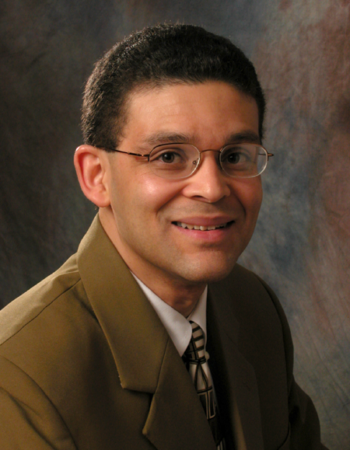
Professor Paulino received his B.S. (1985) from University of Brazilia, M.S. (1988) from PUC-Rio, Brazil, and M.S. (1993) and Ph.D. (1995) from Cornell University. His academic appointments include University of California at Davis (1995-1998), University of Illinois at Urbana Champaign (1998-2015), before joining Georgia Tech in 2015. He also served as the Program Manager at National Science Foundation (2009-2012).
Professor Paulino’s seminal contributions are in the area of applied and computational mechanics, which include the development of methodologies to characterize the deformation and fracture behavior of existing and emerging materials and structural systems; topology optimization for large-scale multiscale/Multiphysics problems; and geometric mechanics associated to origami and tensegrity engineering including configurational metamaterials and reconfigurable structural systems. According to a Daily Digest article, he created “Tech’s first Origami Engineering class” (arguably the first in the USA) during the Fall/2017 and received the “Class of 1940 Course Survey Teaching Effectiveness Award”. He earned the Walter L. Huber Civil Engineering Research Prize from ASCE (2004) and he is a Fellow of USACM (2011), IACM (2012), AAM (2015), EMI/ASCE (2017), and ASME (2019). He received the 2014 Ted Belytschko Applied Mechanics Award from ASME; and the 2015 Cozzarelli Prize from the National Academy of Sciences (NAS), “which recognizes recently published PNAS papers of outstanding scientific excellence and originality,” and the 2020 Drucker Medal from the American Society of Mechanical Engineers. His PNAS paper presents a unique method of coupling tubes derived from the Miura-ori pattern – the “zipper coupled” tubes have a single flexible motion for deployment, but are substantially stiffer for all other deformations such as bending and twisting. Such versatility can be used for making various deployable systems ranging from metamaterials and micro-robotics to aerospace systems and deployable architecture. The PNAS altmetric score indicates that it is “in the top 5% of all research outputs scored by Altmetric” and has “High Attention Score compared to outputs of the same age (99th percentile).” According to the PNAS website, its abstract was downloaded more than 28,000 times. The zipper tubes have been patented in the USA and Japan. In summary, Professor Paulino has contributed to research and education through his publications, well-written series of educational papers, and professional service (e.g. President of SES, 2018).
In conferring the 2020 JN Reddy Medal, Prof. Paulino is cited for pioneering contributions to theoretical and computational mechanics leading to advances in mimetic inspired methods (Virtual Element Method, VEM), topology optimization, and geometric mechanics associated to origami engineering including configurational metamaterials and reconfigurable structural systems.
THE 2019 JN REDDY MEDAL RECIPIENTS
The 2019 JN Reddy Medalists – Prof. Erasmo Carrera and Prof. C. M. Wang were recognized during the banquet at the Second International Conference on Mechanics of Advanced Materials and Structures held at Nanjing University of Aeronautics and Astronautics, Nanjing, P R China, 19-22 October 2019. Brief professional backgrounds and contributions of the two recipients are included here.
Erasmo Carrera
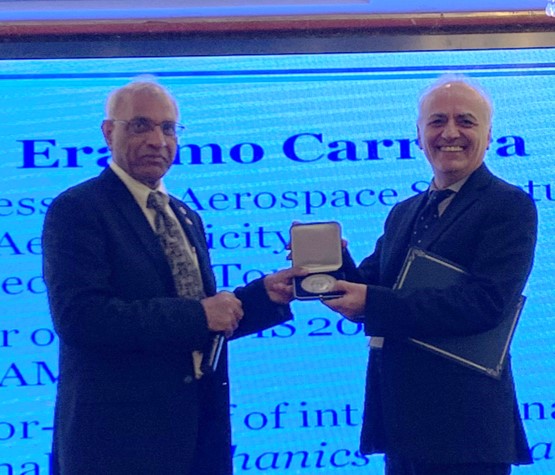
Professor Erasmo Carrera is Professor of Construction and Aerospace Structures in the Department of Mechanical and Aerospace Engineering at the Politecnico di Torino (PoliTO). He obtained his MS in Aeronautics (1986) and Post-graduate degree in Aerospace Engineering (1988) from PoliTO, and Ph.D. in Aerospace Engineering (1991) from Milan Polytechnic and University of Pisa. The topics of his research are: flutter of thermal blankets for missiles; analysis of launcher configurations; inflatable structures; docking of space systems; progressive damage in laminated composite structures; mixed variational methods; zig-zag, mixed, and layer-wise models for multilayered beams, plates, and shells; structural stability; intelligent structures; thermal stresses; aeroelasticity; multi-body dynamics; design and analysis of unconventional lifting systems; vibrations in continuous systems; contact mechanics; wind turbine blades; and others.
Dr. Carrera leads the MUL2 (MULtilayered structures and MULtifield analysis) research group in the DIMEAS Department of PoliTO. The MUL2 deals with the development of advanced structural models for the analysis of multilayer structures, with particular attention to multi-field analyses and fluid-structure interactions. During the last decade MUL2 developed advanced models for beams, plates, and shells using the Carrera Unified Formulation (CUF). These models are used for static, dynamic and aeroelastic, buckling and failure analyzes of isotropic, composite, piezoelectric and aeronautical and spatial structures with variable properties from point to point (FGM). Recently the CUF was also used for the development of advanced models for fluid dynamics. CUF, has been implemented in the NASMAT platform (NASA MATERIAL) developed at NASA Glenn and NASA Langley.
Dr. Carrera has many distinguished visiting positions across the world: University of Stuttgart; Virginia Tech (USA), Institut Supérieur de Mécanique in Paris; and the Center de Recherche Public Henri Tudor in Luxembourg. He delivered invited lectures and seminars in Italy, Austria, USA, Germany, France, Holland, U.K., Canada, Australia, Brazil, Korea, and China. Dr. Carrera is a Highly Cited Researcher in the Engineering and Materials sections. Due to his scientific output, he has been recently awarded the “Honoray Commendator” by the President of Italian Republic. It is one of the highest awards in Italy and it has been given to only 73 Italian Scientists since 2003. He has been the Editor-in-Chief of the Mechanics of Advanced Materials and Structures journal (Taylor & Francis) since 2017; during his editorship, the journal has moved from the 224th to the 25th position among the world’s mechanical engineering magazines, tripling its impact factor.
In conferring the 2019 JN Reddy Medal, Dr. Carrera is cited for many contributions to a variety of research topics in solid and structural mechanics, including the introduction of RMVT into layered structure analysis, creation of CUF, and invention of BTD that have worldwide impact in the analysis of layered structures.
Chien Ming Wang
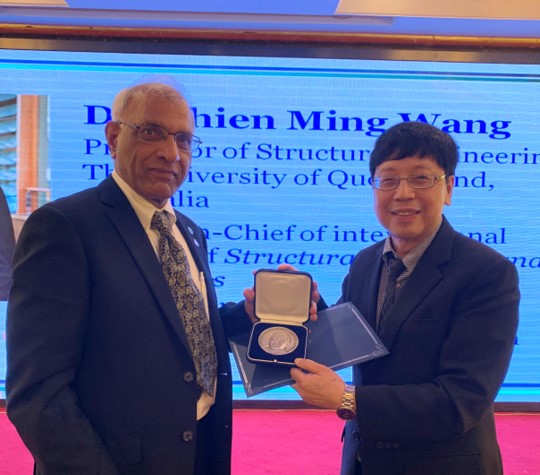
Dr. C.M. Wang is the TMR Chair Professor at University of Queensland, Australia. Dr. Wang’s research interests are in structural stability, vibration, optimization, nanostructures, computational mechanics and large floating structures. He has made significant contributions to these areas by authoring over 430 international refereed journal papers, 6 books, editing 4 books and several conference proceedings. He has over 16,000 citations and h-index of 63 according to Google Scholar.
Dr. Wang is globally renowned for his work on very large floating structures (VLFS). He holds international patents on a pontoon type floating structure, floating breakwater windbreak structure and floating hydrocarbon storage and bunker facility. He has been invited to give keynote lectures and courses on VLFS in many countries. He is the principal investigator of several research/industrial projects on VLFS that amount to over S$10 million. He was the chief consultant for the floating platform at Marina Bay, the floating wetlands at Punggol Waterways, and JTC Corporation assessor for tender documents on floating fuel storage facility. His work on floating wetlands bagged IStructE Singapore Structural Award for Sustainability 2016 and Minister for National Development’s R&D Award 2017. ARC awarded CM with over $1 million research grants to conduct research on a novel floating forest to protect fragile shorelines and Australian ports and on offshore fish farms.
Professor Wang is also well-known for the development of exact relationships between shear deformable beam and plate theories and their classical counterparts. His papers and seminal book coauthored with J.N. Reddy and K.H. Lee on shear deformable beams and plates contain these relationships that help unlock the exact solutions for shear deformable beams and plates. Another notable contribution of Dr. Wang is the use of Eringen’s nonlocal theory for structural analysis that allows researchers to incorporate the effect of small length scale that is important when dealing with nanostructures. His early papers on the nonlocal beam theory have opened up a new direction and spurred the publication of hundreds of papers on the subject.
Dr. Wang is a Fellow of Australian Academy of Technology and Engineering and Academy of Engineering Singapore; he is also a fellow of the Institution of Structural Engineers and the Institution of Engineers, Singapore. He is ranked 14th globally in Civil Engineering in the latest Stanford University Worldwide Survey. He has been listed as a most cited researcher in civil engineering in the Shanghai Ranking for academic subjects 2016.
In conferring the 2019 JN Reddy Medal, Dr. Wang is cited for original and sustained contributions to the advancement of Structural Mechanics, including the development buckling formulas for monosymmetric I-beams, derivation of relationships between shear deformable beams/plates solutions with their classical counterparts, and research and development in very large floating structures.
THE 2018 JN REDDY MEDAL RECIPIENT
The 2018 recipient of the JN Reddy Medal was Professor Carlos Mota Soares of the University of Lisbon at Instituto Superior Tecnico (IST), Portugal. His professional background and contributions are included here.
Carlos Alberto Mota Soares
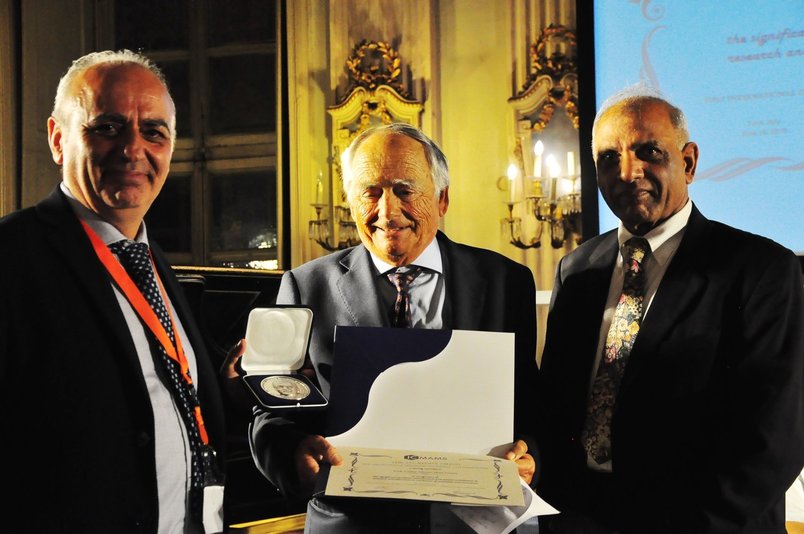
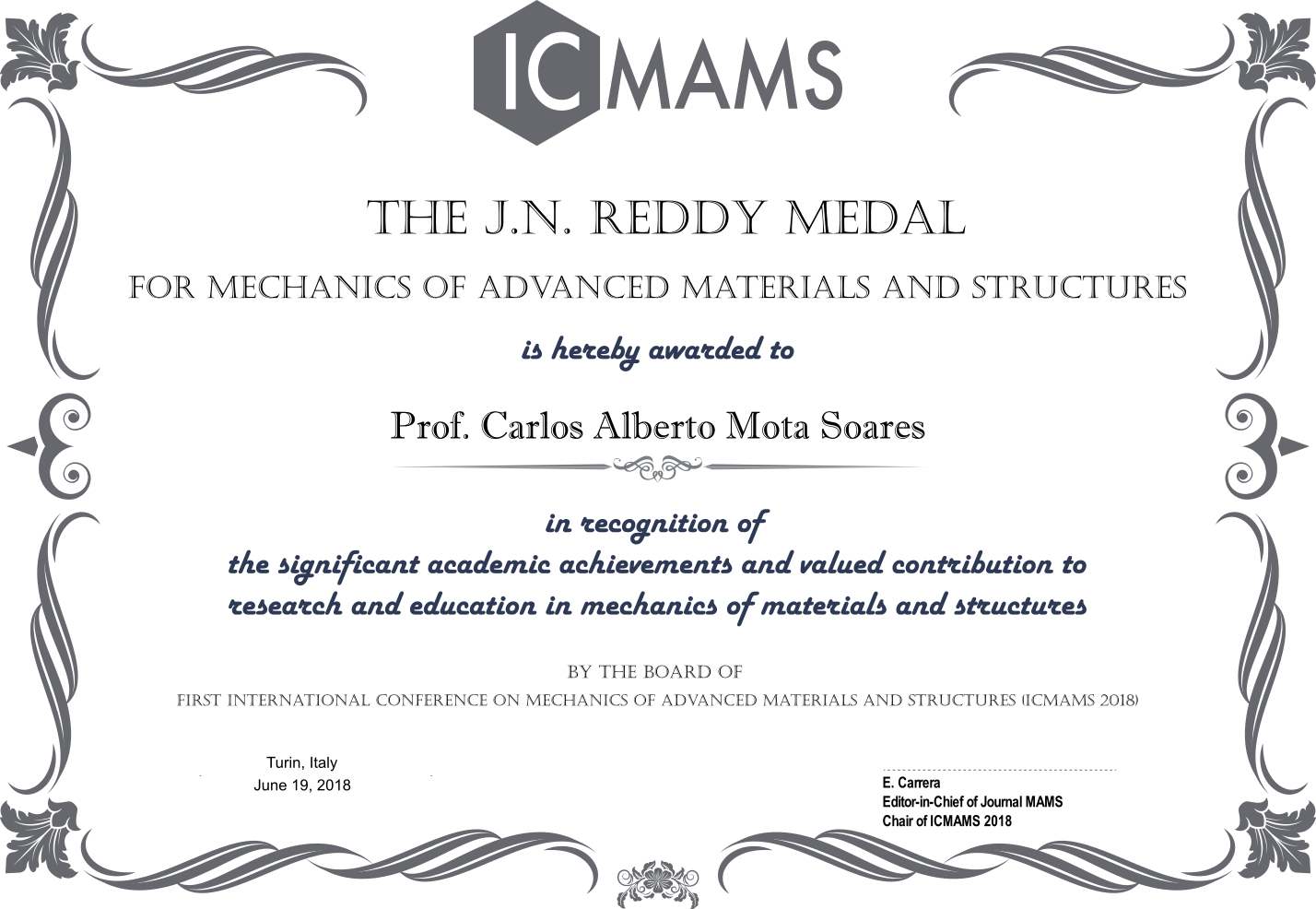
Carlos Alberto Mota Soares is Emeritus Professor of the University of Lisbon at Instituto Superior Tecnico (IST) since 2018, where he was admitted in 1977 and was a full professor from 1985 to 2015.
The career of Professor Carlos Mota Soares started in 1964 as Engineering Apprentice at British Leyland Motor Corporation, where, as a member of the Task Force for Design Automation, which he integrated in 1968, he was a pioneer in introducing computer-assisted design for vehicle components and systems. He obtained a B.Sc. in Mechanical Engineering and an M.Sc. in Solid Mechanics at the University of Aston, Birmingham. Then he got his Ph.D. in Structural Dynamics from the University of Surrey and joined the Institute of Sound and Vibration Research of the University of Southampton, as Associate Researcher between 1974 and 1977. Professor Carlos Mota Soares started working at Technical University of Lisbon since 1977 and became a professor since 1985. He acted as the chairman of the Department of Mechanical Engineering and Institute of Mechanical Engineering.
During his career as a researcher, he has had very significant contributions in several scientific areas such as the computer-aided optimal design of structural and mechanical systems, topology design of structures, mechanics of composite materials and structures, structural engineering, and structural and multidisciplinary optimization. He also had a relevant involvement in national and international organizations promoting science in the field of Computational Mechanics, recognized by his peers through the appointment to high positions and attribution of several awards, which represent the recognition of his prestige as a researcher.
Important Dates
Contact
Abstract Submissions open
Abstract submission deadline
Notification of acceptance
Early registration deadline
Regular registration deadline
Feb 15, 2023
April 03, 2023
May 01, 2023
May 29, 2023
July 12, 2023
Honorary Chair
J.N. Reddy
Conference Chairs
Arun Srinivasa, Thomas Lacy, Jr., and Marcia Cooper
J. Mike Walker ’66 Department of Mechanical Engineering
Texas A&M University, College Station, TX 77843-3123
Email: [email protected]
TEES Center of Innovation in Mechanics for Design and Manufacturing
J. Mike Walker ’66 Department of Mechanical Engineering,
Texas A&M University, College Station, Texas 77843-3123 USA
Emails: [email protected] (Arun Srinivasa), [email protected] (Thomas Lacy, Jr.), and [email protected] (Marcia Cooper).
Website: https://cimdm.tamu.edu/events/conferences/icmams2020/

